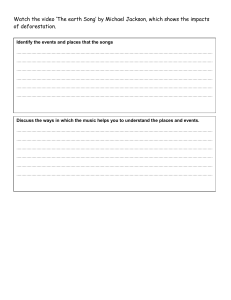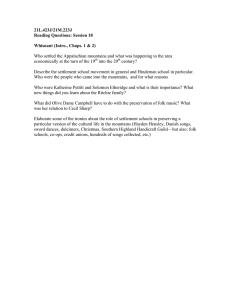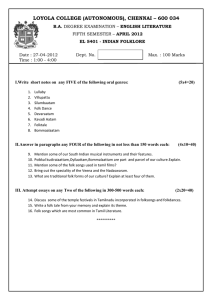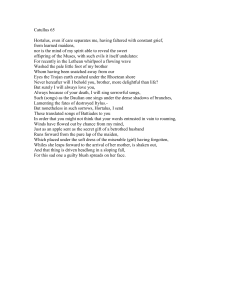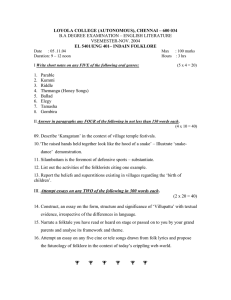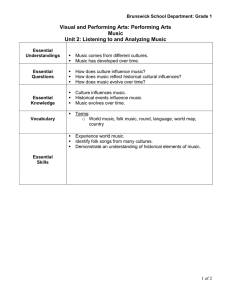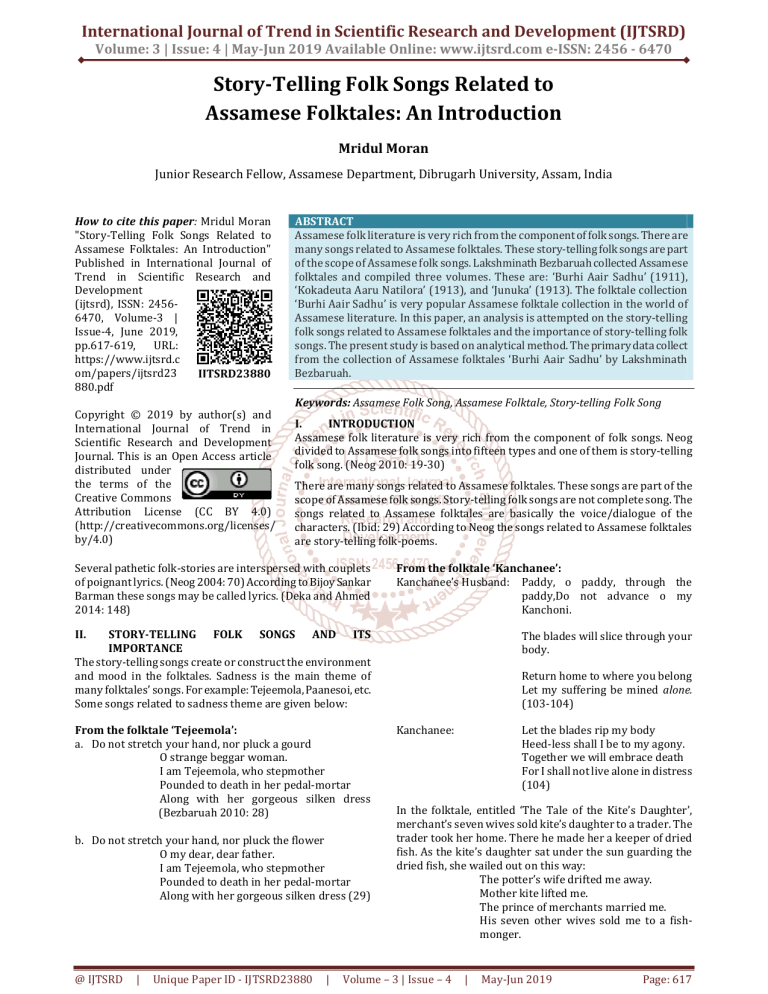
International Journal of Trend in Scientific Research and Development (IJTSRD) Volume: 3 | Issue: 4 | May-Jun 2019 Available Online: www.ijtsrd.com e-ISSN: 2456 - 6470 Story-Telling Folk Songs Related to Assamese Folktales: An Introduction Mridul Moran Junior Research Fellow, Assamese Department, Dibrugarh University, Assam, India How to cite this paper: Mridul Moran "Story-Telling Folk Songs Related to Assamese Folktales: An Introduction" Published in International Journal of Trend in Scientific Research and Development (ijtsrd), ISSN: 24566470, Volume-3 | Issue-4, June 2019, pp.617-619, URL: https://www.ijtsrd.c om/papers/ijtsrd23 IJTSRD23880 880.pdf ABSTRACT Assamese folk literature is very rich from the component of folk songs. There are many songs related to Assamese folktales. These story-telling folk songs are part of the scope of Assamese folk songs. Lakshminath Bezbaruah collected Assamese folktales and compiled three volumes. These are: ‘Burhi Aair Sadhu’ (1911), ‘Kokadeuta Aaru Natilora’ (1913), and ‘Junuka’ (1913). The folktale collection ‘Burhi Aair Sadhu’ is very popular Assamese folktale collection in the world of Assamese literature. In this paper, an analysis is attempted on the story-telling folk songs related to Assamese folktales and the importance of story-telling folk songs. The present study is based on analytical method. The primary data collect from the collection of Assamese folktales ‘Burhi Aair Sadhu’ by Lakshminath Bezbaruah. Keywords: Assamese Folk Song, Assamese Folktale, Story-telling Folk Song Copyright © 2019 by author(s) and International Journal of Trend in Scientific Research and Development Journal. This is an Open Access article distributed under the terms of the Creative Commons Attribution License (CC BY 4.0) (http://creativecommons.org/licenses/ by/4.0) I. INTRODUCTION Assamese folk literature is very rich from the component of folk songs. Neog divided to Assamese folk songs into fifteen types and one of them is story-telling folk song. (Neog 2010: 19-30) There are many songs related to Assamese folktales. These songs are part of the scope of Assamese folk songs. Story-telling folk songs are not complete song. The songs related to Assamese folktales are basically the voice/dialogue of the characters. (Ibid: 29) According to Neog the songs related to Assamese folktales are story-telling folk-poems. Several pathetic folk-stories are interspersed with couplets of poignant lyrics. (Neog 2004: 70) According to Bijoy Sankar Barman these songs may be called lyrics. (Deka and Ahmed 2014: 148) From the folktale ‘Kanchanee’: Kanchanee’s Husband: Paddy, o paddy, through the paddy,Do not advance o my Kanchoni. II. STORY-TELLING FOLK SONGS AND ITS IMPORTANCE The story-telling songs create or construct the environment and mood in the folktales. Sadness is the main theme of many folktales’ songs. For example: Tejeemola, Paanesoi, etc. Some songs related to sadness theme are given below: From the folktale ‘Tejeemola’: a. Do not stretch your hand, nor pluck a gourd O strange beggar woman. I am Tejeemola, who stepmother Pounded to death in her pedal-mortar Along with her gorgeous silken dress (Bezbaruah 2010: 28) b. Do not stretch your hand, nor pluck the flower O my dear, dear father. I am Tejeemola, who stepmother Pounded to death in her pedal-mortar Along with her gorgeous silken dress (29) @ IJTSRD | Unique Paper ID - IJTSRD23880 | The blades will slice through your body. Return home to where you belong Let my suffering be mined alone. (103-104) Kanchanee: Let the blades rip my body Heed-less shall I be to my agony. Together we will embrace death For I shall not live alone in distress (104) In the folktale, entitled ‘The Tale of the Kite’s Daughter’, merchant’s seven wives sold kite’s daughter to a trader. The trader took her home. There he made her a keeper of dried fish. As the kite’s daughter sat under the sun guarding the dried fish, she wailed out on this way: The potter’s wife drifted me away. Mother kite lifted me. The prince of merchants married me. His seven other wives sold me to a fishmonger. Volume – 3 | Issue – 4 | May-Jun 2019 Page: 617 International Journal of Trend in Scientific Research and Development (IJTSRD) @ www.ijtsrd.com eISSN: 2456-6470 And he made me a keeper of dried fish (49) The story-telling folk songs are basically the voice or dialogue of the characters. In the folktale ‘The Raven and the Sparrow’, raven called out to the sea, potter, land, buffalo, dog, cow, grass, and blacksmith in this way: a. Give me clay to give the potter To make a pot to carry water With which I will wash my beak So that I may eat the sparrow (4) I will wash my beak So that I may eat the sparrow (5) In the folktale ‘The Tale of the Kite’s Daughter’, the kite’s daughter called her mother in this manner: The frontal leaf of the plantain plant Sways to and fro in the breeze For my mother the kite To alight before me (47) In the folktale ‘The Tale of the Frog’, the frog called the animals by singing: Eating fried chick-peas I walk on the road Whosever joins me Is welcome to share my load (87) b. Give me milk to feed the dog To build his strength To kill the buffalo his horn To dig the land for some clay For the potter to make a pot To carry water with which This character is also present the following folktales: The Raven and a Sparrow, A Lady Gardener and a Flowering Plant, The Tiger and the Crab, Tejeemola, The Globe Fish, The Tale of the Kite’s Daughter, Tula and Teja, Teekhor and Sutibai, Paanesoi, Champawati, The Tale of the Frog, and Kanchanee. Sl. No. 1 2 3 4 5 6 7 8 9 10 11 12 13 14 15 16 17 18 19 20 21 22 23 24 25 26 27 28 29 30 Name of the Folktales Name of the Owner of the Voice The Tale of Cat’s Daughter The Monkey and the Fox Elephant-Fruit Princess The Raven and a Sparrow A Lady Gardener and a Flowering Plant The Sly Fox The Tiger and the Crab Tejeemola The Old Couple and the Jackals The Long-legged Visitor The Globe Fish The Son Born Late The Fortune-teller The Tale of a Catfish A Strong Man The Tale of the Kite’s Daughter Tula and Teja Tit for Tat Teekhor and Sutibai Champawati The Tale of the Foolish King Paanesoi The Tale of the Son-in-low The Man with Nightblindness The Tale of the Frog The Tale of Tawoi Lotkon The Blessed Woman The Two Clever Men Kanchanee Raven Lady Gardener, Plant, Cow, Cowherd, Cook, Woodcutter, Blacksmith, Coal-dealer, Cloud, and Frog Raven, Farmer Gourd, Fruit, Flower Fish Number of Songs (with repetition) 8 1 2 4 - Kite’s Daughter 3 5 Teja, Teja’s Father, Birds, King, Queen, and Men Teekhor Champawati, Python, Laagee, and her daughter - 18 2 3 - Paanesoi - 1 - Frog Kanchanee, her husband, and King Total Number of Songs Table 1: Number of Folk Songs Related to Assamese Folktales 1 3 51 Recurrences are seen in the many folk songs related to Assamese folktales. This recurrences and repetition performed the role of catalyst to describe the story of the folktale. Example from the ‘Tejeemola’ folktale: A. Don’t extend your hand, don’t pluck a gourd… (28) B. Don’t extend your hand, don’t pluck a fruit… (28) C. Don’t extend your hand, don’t pluck a flower, dear father… (29) @ IJTSRD | Unique Paper ID - IJTSRD23880 | Volume – 3 | Issue – 4 | May-Jun 2019 Page: 618 International Journal of Trend in Scientific Research and Development (IJTSRD) @ www.ijtsrd.com eISSN: 2456-6470 Figure 1: Assamese Folktales with and without Songs The tale named ‘A Lady Gardener and a Flowering Plant’ is totally lyrical. The text of this tale is here: There was a lady who loved gardening. One day with utmost care she planted a certain flowering plant. Many months passed but the plant refused to flower. She was baffled, therefore, one day she decided to speak to the plant. Gardener: O plant, O plant why don’t you flower? Plant: The cow eats my buds, why should I flower? Gardener: O cow, O cow why do you eat the buds? Cow: The cowherd does not tend to me, why shouldn’t I eat? Gardener: O cowherd, O cowherd why don’t you tend to the cow? Cowherd: The cook does not give me food, why should I tend? Gardener: O cook, O cook why don’t you give food? Cook: The woodcutter does not give me wood, why should I cook? Gardener: O woodcutter, O woodcutter why don’t you supply fire-wood? Woodcutter: The blacksmith doesn’t give me an exe, why should I supply? Gardener O blacksmith, O blacksmith why don’t you give an exe? Blacksmith: The coal-dealer doesn’t provide me with coal, why should I give? Gardener: O coal-dealer, O coal-dealer why don’t you provide the coal? Coal-dealer: If I should supply coal, why does the cloud rain? Gardener: O cloud, O cloud why do you rain? Cloud: The frog croaks, why shouldn’t I rain? Gardener: O frog, O frog why do you croak? Frog: Why should I leave the way of my ancestors? (20-21) III. CONCLUSION An analysis of these story-telling folk songs related to Assamese folktales has led us to put forth the following conclusions: Story-telling songs help the story-teller to tell a folktale nicely. The story-telling folk songs helped to increase the interaction between the story-teller and the audience. The story-telling songs create or construct the environment and mood in the folktales. The story-telling folk songs are basically the voice or dialogue of the characters. Reference [1] Bezbaruah, Lakshminath. Burhi Aair Sadhu. 1st Edition, Guwahati: Lakhi Prakash Bhawan, 2010 [2] Deka, Taranee and Kamaluddin Ahmed (editors). Adhunik Asamiya Sahityar Aitihya aru Lakshminath Bezbaruah. 1st Edition, Guwahati: Publication Department of Gauhati University, 2014 [3] Neog, Maheswar. Asamiya Sahityar Ruprekha. 11th Edition, Guwahati: Chandra Prakash, 2010 [4] ――. Essays on Assamese Literature. 1st Edition, New Delhi: Omsons Publications, 2004 [5] Sarma, Madan. Lakshminath Bezbaroa: Srijan aru Monan (Lakshminath Bezbaroa: Creations and Contemplations). 1st Edition, Guwahati: Aalibaat, 2013 @ IJTSRD | Unique Paper ID - IJTSRD23880 | Volume – 3 | Issue – 4 | May-Jun 2019 Page: 619
